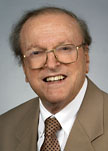Difference between revisions of "Thomas Gold"
(Imported from text file) |
(Imported from text file) |
||
| (One intermediate revision by the same user not shown) | |||
| Line 28: | Line 28: | ||
* 1967 - "[[The Nature of Time]]" ([http://www.amazon.com/Nature-Time-Gold-D-L-Schumacher/dp/B000K9ZHIQ/ref=sr_1_9?ie=UTF8&s=books&qid=1224536890&sr=8-9 Read in full]) | * 1967 - "[[The Nature of Time]]" ([http://www.amazon.com/Nature-Time-Gold-D-L-Schumacher/dp/B000K9ZHIQ/ref=sr_1_9?ie=UTF8&s=books&qid=1224536890&sr=8-9 Read in full]) | ||
| − | [[Category:Scientist]] | + | [[Category:Scientist|Gold Thomas]] |
| − | [[Category:Cosmology]] | + | [[Category:Cosmology|Gold Thomas]] |
Latest revision as of 06:27, 2 January 2017
Thomas Gold | |
|---|---|
 | |
| Born | May 22, 1920 |
| Died | June 22, 2004 |
| Residence | Ithaca, NY, United States |
| Nationality | Austrian / USA |
| Known for | Origin of Hydrocarbon Fuels, Cosmology, Steady State Universe |
| Scientific career | |
| Fields | Professor Emeritus of Astronomy |
Copyright ? Cornell University
ITHACA, N.Y. -- Thomas "Tommy" Gold, a brilliant and controversial figure in 20th century science and professor emeritus of astronomy at Cornell University, died June 22 at Cayuga Medical Center, Ithaca, N.Y., after a long battle with heart disease. He was 84 years of age.
Gold's reputation as a Renaissance man was surpassed only by his penchant for unconventional theories -- from the origin of the universe to the source of petroleum. Few scientists ever attempt what Gold made a career of, staking their reputations on ideas that radically challenge the methods and assumptions of an entire discipline.
Said Joseph Veverka, chairman of Cornell's Department of Astronomy and a longtime colleague: "Tommy will be remembered fondly by all of us for his incisive and provocative ideas, for his sincere dedication to his colleagues, as well as for his wide-ranging contributions to physics and astronomy extending over such varied topics as the steady-state theory of the universe, pulsars, the lunar regolith and the geochemistry of the Earth's mantle."
His "steady-state" theory, for years considered by many cosmologists a possible alternative to the "big-bang" theory of the origin of the universe. Gold developed the idea of a steady-state universe that has no beginning or end and in which matter is constantly being created, with fellow astrophysicists Fred Hoyle and Hermann Bondi while a graduate student at Cambridge.
Books
- 1998 - "The Deep Hot Biosphere" (Read in full)
- 1967 - "The Nature of Time" (Read in full)